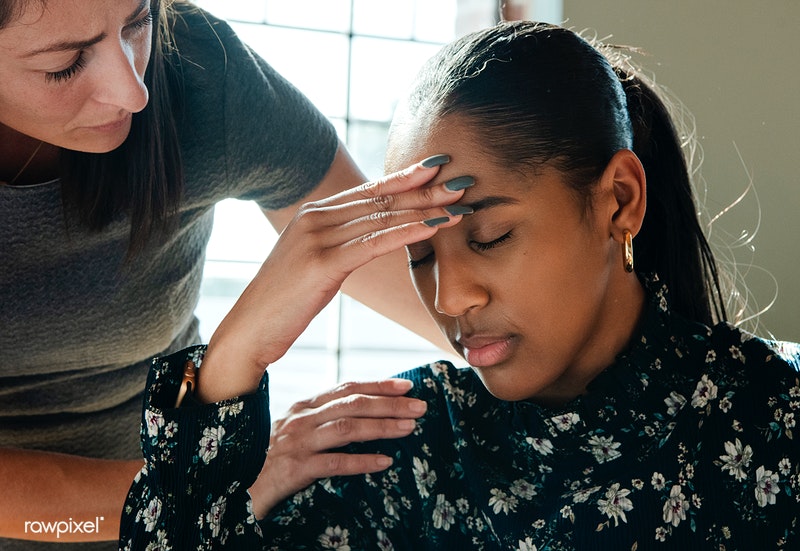Medically Reviewed By: Chukwuma Chinaza Adaobi
The months following the birth of a baby are ones of great adjustment. Changing body chemistry, lack of quality sleep and numerous other stressors lead many women to experience postpartum depression in the year following childbirth.
Sadly, inadequate information and understanding of the nature of postpartum depression, along with a pervasive stigma in our society about its exact cause, leave many women to suffer alone. Postpartum depression is a disease and is never the fault of the mother - nor is it an indication of their worthiness to be a mom.
Healing is available for postpartum depression, and no mother should feel shame for pursuing treatment for this medical condition. It is real, it is common, and it is treatable.
How Many People Experience Postpartum Depression?
Postpartum Depression is incredibly common. While some estimates cite postpartum depression statistics as high as 20% (one in five women), most experts agree that the frequency is around 15% (one in seven women).
When Does Postpartum Depression Occur?
Postpartum depression can happen at any time during the baby's first year of life - not just immediately after birth. In fact, postpartum depression tends to spike around the time the baby is five months.
What Are the Symptoms?
Most women experience some level of "baby blues" during the first two weeks after childbirth due primarily to the hormonal shifts that occur during that period. The primary symptom is an underlying feeling of sadness.

Postpartum depression, however, is marked by persistent feelings past the initial two-week mark, and the symptoms are much broader than simply "sadness." In fact, many women don't recognize that they may be suffering from postpartum depression simply because sadness isn't their primary symptom. Postpartum depression often doesn't look like people think it does. Symptoms often include:
- Anger, rage, or irritability
- Difficulty sleeping - even when exhausted
- Feeling "flat" - no strong feelings of either happiness or sadness
- Unexplained crying
- Extreme worrying or anxiousness
- Intrusive thoughts of serious harm or death coming to the baby
- Not feeling connected or loving toward the baby
- A general feeling of "this isn't what I expected it to be"
In more extreme cases (typically associated with postpartum psychosis), symptoms can include:
- Hallucinations
- Paranoia
- Thoughts of suicide or of harming the baby
- Confusion/disorientation
It's important to note that most high-profile media stories highlight women who suffer from postpartum psychosis, giving many sufferers the impression that if they are not experiencing these extreme symptoms, they're not experiencing postpartum depression.
It is simply not true. The truth is that postpartum depression symptoms occur on a spectrum, and a woman may only suffer a few of the above symptoms.
What Causes Postpartum Depression?
There isn't one single cause or predictor of postpartum depression, but rather it is caused by a combination of complex factors. Here are some of the culprits:
Hormones
Women make jokes and hear endless flippant remarks about "hormones," but the truth is that they are real and they are powerful. There are many physiological changes that occur during and after pregnancy, not the least of which are incredible fluctuations of hormones that cause very profound chemical changes in a woman's body. In many ways, these changes are miraculous. In other ways, they wreak havoc.
More specifically, the hormones estrogen and progesterone are significantly elevated during pregnancy, and then rapidly return to normal levels within 24 hours of childbirth. It is a huge adjustment for a woman's brain chemistry to adapt to, and the primary contributor to postpartum depression.
Lifestyle Factors
Some of the practical challenges of parenting a newborn exacerbate the hormonal effects, and the net result can be postpartum depression. These include:
- Lack of sleep
- The added stress of parenting a newborn
- Added challenges in the parental relationship
- Loss of flexibility/free time
- Lack of a good support system
- Lack of time to exercise
- Poor nutrition
- A strong desire or pressure to be the "perfect parent"/Type A personality
Social Factors
Teen moms and women who are in poverty have higher rates of postpartum depression. It's likely that the added stress experienced by these groups of women as they enter motherhood exacerbates the other factors and leads to their increased risk of postpartum depression.
Medical History and Genetics
Just as with traditional depression, there is a genetic component and women who have a family history of depression, or postpartum depression is at an elevated risk to struggle with the illness themselves. Similarly, women who have suffered from depression in the past have a higher likelihood of struggling post-birth, as well as women who experience premenstrual dysphoric disorder (PMDD) with their regular menstrual cycles. PMDD is an extreme form of PMS and an indicator of a woman's chemical brain response to hormonal fluctuations.

Struggles with fertility and difficulty conceiving also increase a woman's likelihood of experiencing postpartum depression. Finally, a traumatic or medically difficult birth experience is also a risk factor.
How Can I Deal with Postpartum Depression?
There are many things you can do to combat postpartum depression - it's not something you just have to suffer through. If you believe you are struggling, the first step is to speak with your doctor about your concerns. They will ask you more detailed questions to see if a diagnosis of postpartum depression is right for you.
Some women can combat their postpartum depression with simple lifestyle adjustments - other women need more comprehensive medical intervention. Regardless, it's important to remember that postpartum depression is, at its core, a chemical issue - and if you are not able to improve your symptoms without medical support, it is NOT a personal failure.
Postpartum depression is a complex relationship of multiple factors - and treatment for postpartum depression is equally complex. Here are some things you can do to combat the illness and return to wellness.
Develop Support
Be open about your struggle with postpartum depression with other mothers in your social circle. While you might have to battle the illness, you do not have to battle shame. Think about it - if as many as one in five women suffers from postpartum depression, the likelihood that you know women who have gone through it is incredibly high.
Make it a priority to spend time with friends and family. While it might not be possible to do all of the things you did pre-baby, gathering with others in a social setting is healthy. If you don't have a lot of friends who are mothers, contact your birthing hospital or your obstetrician and ask them about local parent/baby groups in the area. They are a great way to connect socially (and commiserate about the challenges of parenting a baby) with other moms.
You may also want to consider a local support group for women struggling with postpartum depression. These are very supportive, non-threatening groups that allow you to learn more about the illness, what it looks like in everyday life, and feel less alone in your struggle. They are also a wealth of information on local professional resources to help you. You don't need a diagnosis to attend - they welcome all new mothers. Ask your local hospital, doctor, or obstetrician for help finding one in your local area.
Make Simple Lifestyle Adjustments
There are a few things you can do to try and combat postpartum depression on your own. These include:
- Ask a partner to take an overnight feeding (pump if you're nursing) to help you get a longer stretch of restorative sleep
- Schedule regular exercise
- Get outside in the sunshine and go on walks
- Pay attention to your nutrition; eat healthily
- Find ways to exercise regularly
- Eat a small piece of dark chocolate (yes, really!)
Seek Professional Help
Sometimes lifestyle adjustments don't help, or adequate social support is hard to come by. Counselling or talk therapy has been proven to be incredibly helpful in treating postpartum depression. A counsellor or therapist can not only help you work through the major lifestyle transition of adding a newborn to your family, but they can also walk alongside you and help you to find ways to implement some of the lifestyle changes listed above - because it can seem overwhelming to do it on your own.

A trained counsellor will help you identify the root causes of your negative feelings, give you guidance to process them effectively, and coach you on ways to improve those specific aspects of your life. And while there are many options available, the reality is that making time for appointments which caring for a newborn can be incredibly challenging. Navigating nursing and napping schedules, along with finding childcare, can make it feel nearly impossible to leave the house. Thankfully, there is quality and professional therapy available online to provide postpartum depression treatment, which is a perfect solution for a new mother to get the help she needs.
Medications are also available to help with postpartum depression. Your doctor can recommend and prescribe one that will work best in your situation, but even if you choose not to try medication make sure you keep them in the loop. Explain to your doctor that you feel you are experiencing signs of postpartum depression but would like to try non-medicated strategies to treat it before deciding whether you need medication. They will be able to tell you what symptoms to watch for to tell if your illness is getting worse and if you might need additional medical support.
The bottom line is you don't have to go through this alone. Postpartum depression is a common illness that can be treated in many ways. If you are struggling after the birth of a baby, seek help. Take action. Call your doctor. Contact a counsellor.
After all, this should be one of the most joyous times of your life. Don't let postpartum depression steal that from you. Take charge, and take it back.




Natural herbs have treated so many illnesses that drugs and injections can't treat. I've seen the great importance of natural herbs and the wonderful work they have done in people's lives. I read people's testimonies online on how they were treated of HSV, HPV, Herpes, Liver diseases, Anxiety, Fever ,diarrhoea, aches and pains, sore throat , etc , by natural medicine, so I decided to contact the Naturopath Dr because I know nature has the power to heal anything. Believe it or not. but I am a living testimony. There is no harm trying natural herbs. Contact Dr on Whats-App . +233502715551. text/call via: +1 (719) 629 0982 ,For herbs and medications. Or you can also contact through his Facebook page @ Dr Chike Herbal Remedy.
ReplyDeleteI was born epileptic and at the same time I was having gastro disorder, but I am now free and cured with Dr Itua Herbal Made Medicine. I was seventeen and sitting at my computer when I fell out of my chair. Only thing I remember is waking up with the worst headache I had ever had in my life. I had never taken medication and I hated swallowing pills but I had to start. I switched between all kinds of medication because I didn't take them like I was supposed to. One day I had just finished running errands and was at my sister's house when I fell to the floor again. I woke up with a bad headache and my 2 year old Niece leaning over my leg asking me if I was OK. By then I had just started college and was one the verge of losing my license. My school is an hour away from where I live so I really got set back because I wasn't allowed to drive until I got my seizures under control. I would love to know how others have handled their epilepsy! So My sister's friend Emma Told my sister about a herbal Doctor who resides in west Africa(Nigeria) Because Emma is from Africa as well, My sister told me about it then we decided to give it a try. My sister contacted him also tell him about my autism too.he assures my sister that his herbal medicine will cure my epilepsy and my autism, I paid for the herbal medicine then he delivered to Charleston Post office I was called to pick it up which i quickly did, I drank it for two weeks as prescribed happily I went for diagnose and find out my Epilepsy and Autism is gone and today making it 9 Months and I'm now free from Autism, Seizure and Epilepsy, I will continue to share Dr Itua Natural Herbal Medicine works. I will recommend Dr Itua to anyone who is suffering from,,,AUTISM, EPILEPSY, SEIZURE, COLD SORE, HERPES, HIV/AIDS.Shingles,Gastro disorder,Diabetes,Back Pain,Cancer,HPV,Lupus,Dr Itua Contact Information..... Email...drituaherbalcenter@gmail.com.... WhatsApp Number....+2348149277967. Live Happily Again With Dr Itua Herbal Made Medicine....
ReplyDelete